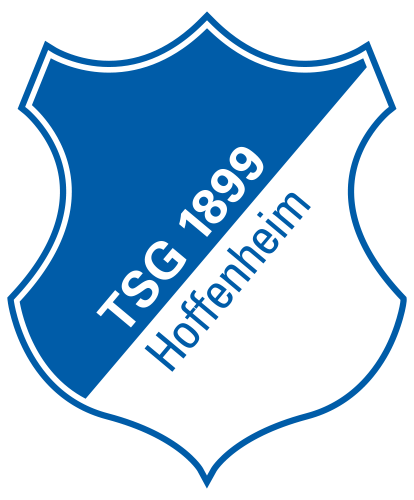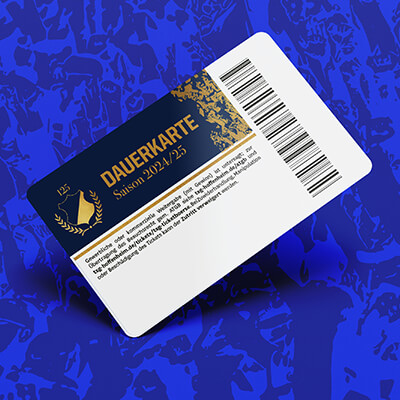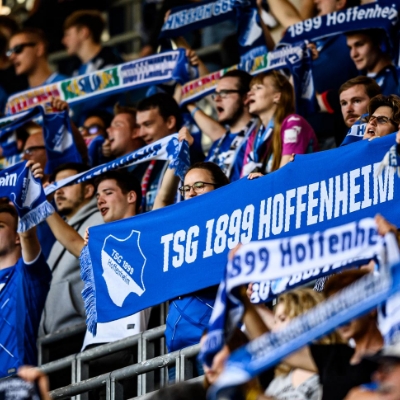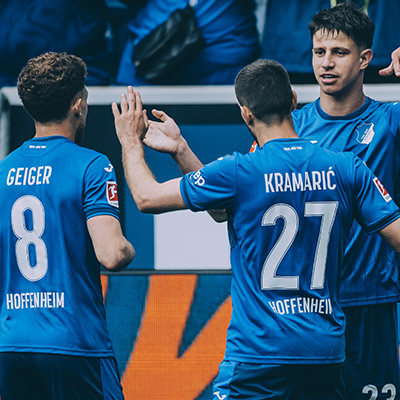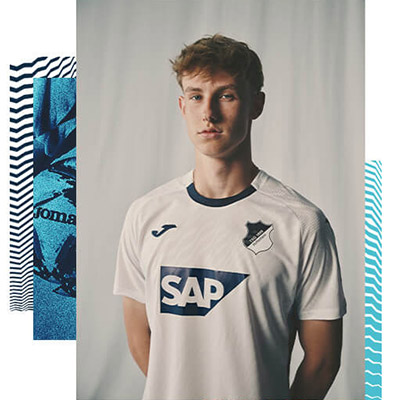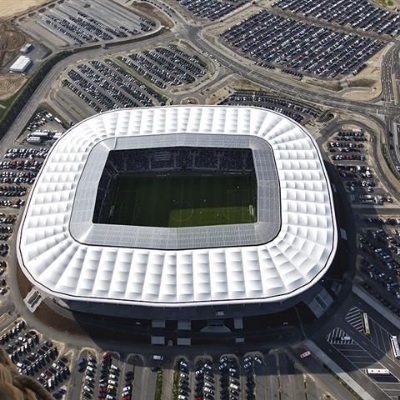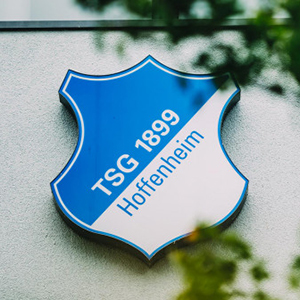"The real heroes work in the hospitals"
Sargis, you too can look back on an unsettled and not easy year. In November, you also became infected with coronavirus while travelling with the national team. How are you and how did you cope with the illness?
"I'm healthy again and I'm really happy about that. Especially at the beginning, I was really tired. But after that I only had a little cough and no more serious problems. I was able to do some exercises at home during the quarantine and prepare myself for my second comeback of the year."
What options did you have to train at home?
"I was able to do some exercises with Christian Neitzert (physio at TSG Hoffenheim, editor's note) via video conference. TSG also sent me an exercise bike to keep me fit. But of course, that's nothing compared to getting back out on to the pitch. I'm glad to be able to let loose out in the fresh air again."
You mentioned that after your serious ankle injury in February 2020, you had just come back and got going straight away, scoring three goals. How did you deal with the latest setback?
"It was really very bitter because I was in good shape again. But I gave myself courage because I knew that I had already managed to come back after a serious injury once this year and in that case the lay-off had lasted several months. That's why I've been confident since the diagnosis that the two-week quarantine won't be a big setback for me. I believed in myself and just thought about getting back out on to the pitch quickly and helping the team."
An injury never comes at a good time. Was it still particularly annoying for you back in February?
"Definitely. I was in really good form and an integral part of the team in my first Bundesliga season. But I think that's all part of football. I worked hard to come back and I did well. It was also an important experience for me, which made me stronger with hindsight."
After your comeback, you celebrated your Europa League debut and scored your first two goals in European competition. Was it a special feeling?
"As a striker, you are happy about every goal, but I was particularly pleased about that. They were my first two goals after the long injury and in the Europa League too. I want to get back to where I was before my injury and the virus. I now know that I can perform and score at this level, which helps me enormously, especially in difficult times."
Three and a half years ago, you were playing in the Regionalliga and now we are talking about your first goals in a European club competition. Could you imagine how your career would develop at the time?
"No. It all happened so quickly and all of a sudden I was scoring goals against Bayern and playing in international competitions. But I was able to think about it all and process this development a bit during my rehab. I don't know if that would work again. It was absolutely incredible. I'm very proud of it because I don't think that just any player could succeed in a career like that."
You moved from the Regionalliga (German fourth tier) to the Bundesliga 2 and two years later you moved to the Bundesliga. Which jump was bigger?
"I think the difference between the Regionalliga and the Bundesliga 2 was a bit bigger. Before that, there was a lot of something like amateur football and all of a sudden everything was very professional. I had to get used to that first. However, I was given the necessary time in Regensburg and then everything worked out. It was the same with TSG when I made the move from the second division to the Bundesliga. In retrospect, I can say that both steps were challenging, but definitely the right ones."
On your debut in the starting 11 in the Bundesliga, you scored two goals against Bayern Munich in October 2019 and became a match-winner. What a feeling that must have been!
"It's still the most important game of my career. My starting 11 debut was picture-perfect, scoring two goals against the team who would go on to win the treble. And I actually missed the easiest chance (laughs). But these are amazing memories that I will never forget. That game will always remain a very special moment in my career."
Against Bayern, you scored two goals as a starter. But even as a substitute, you have a good record in terms of goals per game. You've scored six goals as a super-sub for TSG so far. Do your strengths prove particularly effective in that role?
"I try to be there right from the first second in the game, whether it's as a starter or coming off the bench. So far, I have had plenty of success in both roles. I can find the space and take advantage of my pace. In the past, this has led to a few goals, especially as a substitute. As long as I am scoring regularly and helping the team, I am happy for it to continue that way."
When you signed a year and a half ago, Alexander Rosen spoke of an understudy role for you. Would you have expected it to go so well and would you say that your role has changed in the meantime?
"I knew I was going to get my chances at TSG and wanted to make the most of them. And that worked out quite well. I have played my way into the squad and have received plenty of praise from all sides. I'm so happy about that and it makes me feel that I took to the initial understudy role well and have now grown out of it a little bit."
As a reward for your performances, you were granted a contract extension until 2023. What do you hope to achieve with TSG over the next few years?
"First of all, I am very grateful to TSG for signing me in the first place at the time. It is not normal for a top club from the Bundesliga to buy a second division striker. The fact that my contract now runs until 2023 makes me happy. I want to have as much success as possible with the team in the next few years. In the Bundesliga, we have not been as successful as we had hoped as yet, but I am confident that it will all work out again. We are on a good track and still have plenty of important and exciting games ahead of us before the end of the season."
What can TSG achieve in the Europa League after the early qualification from the group phase?
"We look from game to game and then hopefully from round to round. There are great teams coming in from the Champions League. We are hungry for more and for the first games in the knock-out phase in Europe in TSG's history."
On the international scene, you don't just score goals for TSG. In the last international game of the year, you scored for Armenia in a 1-0 victory goal against Georgia. In the light of the Nagorno-Karabakh conflict, the victory was, of course, greatly enhanced from an emotional perspective in the media and social networks.
"It was a special game for us. It was about more than just football. We wanted our game to make the people of Armenia a little happier in such a difficult situation. They don't have a lot to feel good about at the moment, so we want to play especially for the nation and our compatriots at the moment. I got a lot of reactions after that and it means so much to me that we could bring a little joy to people at a very difficult time for the country."
If you score the winning goal in a moment like that, does that make you a hero in your home country?
"No, I wouldn't go that far. At the end of the day, we're just playing football. For me, the people working in the hospitals deserve that label. People who fight for the country and fight for the right people. They are the real heroes."
There was war between Armenia and Azerbaijan around the Nagorno-Karabakh region, a ceasefire was agreed in the days surrounding the game against Georgia, and many refugees fled to the capital, Yerevan. How do you feel about the situation in your home country?
"It's very sad. To see how people are fighting for their lives is madness. I hope, of course, that it will all be over soon and that it will become half normal again. It cannot be that 18-year-olds have to go to war to defend their country. You realise that you don't have any real problems just because you have to spend a few months or weeks not playing football."
Do you have any relatives who are affected by the situation?
"Some of my family still live in Armenia, but luckily they didn't have to flee. They live in Yerevan. But of course they are also affected by the situation. I hope they will soon have more reasons to rejoice."
As a five-year-old, you emigrated from Armenia with your family. How did that decision come about?
"That was in 1998, my father had lost his job. My aunt had already emigrated to Germany two years earlier and helped us. We first landed in Ueckermünde in an asylum home and then we moved to Neubrandenburg to build a new life."
How were the first years in Germany for you and your family? A foreign country, a different language …
"I can't really remember the early days. I was only five years old at the time. It was not easy, of course. Especially with the language. But we tried to learn German as quickly as possible. It wasn't that hard for me as a young child. I always used to meet with other kids on the football pitch, right from the start. That was something that helped us make connections. On the pitch, where you come from and what language you speak do not matter. The ball is all that matters. I had a very nice childhood and I enjoyed it all very much."
And how is your family doing today? Do you still often speak Armenian to one another?
"Yes, everything is great. My parents now live and work in Hamburg and live with one of my three older sisters. They have also settled in very well in Germany. But we still speak only Armenian among ourselves in our family."
It sounds like you're doing very well despite the recent Coronavirus-enforced lay-off. You seem happy.
"You could say that. My girlfriend and I feel completely at home in Heidelberg and the region. My family is also doing well and I'm back on the football pitch. Of course, the situation in my home country is on my mind, but when I look at my own personal life, I couldn't ask for much more."



